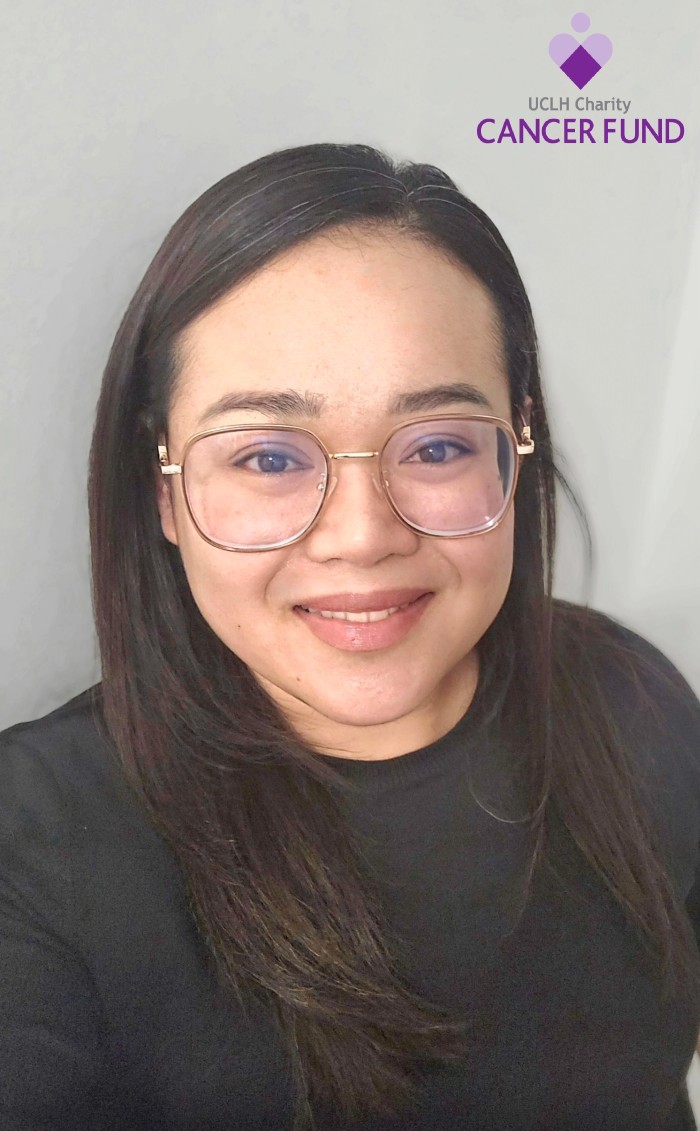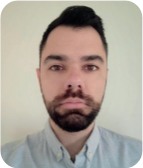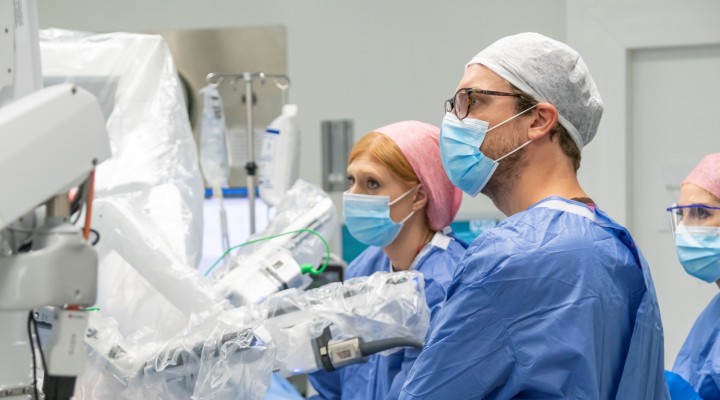One of the areas we’re most excited to have funded is qualifications for multiple staff in Independent Prescribing. This course certifies healthcare professionals to prescribe medication for patients within their scope of practice. This can reduce treatment waiting time for patients, sometimes by entire days, as the processes no longer requires multiple members of staff. Staff are now qualified to review, prescribe, and follow up with patients, reducing the burden on the rest of the team. This has made a significant impact across different teams, including radiotherapy, palliative care and more. A small change in staff training making a huge difference in patient care.
Staff training
Around 40% of our funding goes towards staff training and welfare, helping staff to advance their capabilities, and improve their confidence through courses, conferences and qualifications.
Take a look at some of the highlights below, including impact, feedback from staff and more.
Helping to reduce patient's waiting times

Improving Patient Safety
By Maria Lourdes Valladolid, Acute Oncology Clinical Nurse Specialist

"I have been a nurse in UCLH for over 6 years and have always been passionate on taking care of patients with malignancy. As more and more people are afflicted with cancer, continuous learning is an essential component to ensure that we are professionally prepared to address our patients' needs. UCLH Charity Cancer Fund supports this mission and I have been blessed to further my education and training towards Advance Practice through this grant. With this learning endeavour, I was able to work with our team of doctors to develop a Clinical Handbook for Oncologic Emergencies in the department, which we will soon present in the Festival of Excellence. As an Acute Oncology CNS, I find that this will be very helpful in providing clinical decision support for medical staff when patients present acutely due to side effects of treatment and will have a big impact on patient safety. Thank you UCLH Cancer Fund for always making a difference not only in the lives of our cancer patient's but also for the unwavering support for oncology nurses like myself!"
"Dear Cancer Fund Supporters,
I am thrilled to share some incredible news, as I have recently participated in the microsurgery course of Griffin Institute which promises to revolutionise patient care. Microsurgery is a highly specialised and utilises powerful microscopes and delicate instruments to perform intricate procedures on small structures such as blood vessels and nerves. This extraordinary technique allows surgeons to navigate the intricate landscape of the human body with unparalleled precision.
The successful completion of this course marks a significant milestone for the clinical team and, more importantly, our patients. Here’s how the expertise in microsurgery will enhance the quality of care across cancer services at UCLH:
Enhanced Precision: Microscopic magnification enables surgeons to operate with incredible precision. This translates into improved outcomes for our oncology patients, particularly in intricate procedures like head and neck surgery.
Faster Recovery: Microsurgery techniques can expedite recovery times. By minimising tissue trauma and scarring, we reduce post-operative discomfort and enable patients being treated for cancer to regain their health swiftly.
Expanded Treatment Options: The mastery of microsurgery opens doors to a broader range of treatment possibilities. We can now undertake complex reconstructions that were previously considered unfeasible. This innovation allows us to provide our patients with novel therapeutic options, transforming lives and rewriting medical boundaries.
The Journey Ahead: A microsurgery course is just the beginning of an incredible journey in reconstructive surgery. Continuous learning and development, pushes the boundaries of medical science and technology, and strengthens the aim to provide the highest level of care to our patients and contribute to the advancement of medical knowledge."
Dimitris Tatsis
Senior Clinical Fellow, Head and Neck (OMFS), Microsurgery Enthusiast

We understand how difficult it is to talk about cancer, which is why we recently funded training days for all staff on the three cancer surgery wards at University College Hospital at Westmoreland Street, supporting staff to improve their ability to manage difficult conversations and situations.
Ward sister Faye said:
“We identified that some staff could benefit from training to give them more confidence when dealing with difficult conversations and support them to find their voice to help them advocate for their patients. Training involved staff being encouraged to work through different approaches to challenging situations and conversations where actors were used to facilitate role play. We were able to tailor our scenarios to reflect the experiences that staff have been in on the ward and cover themes that have come up in meetings. Now, our staff are more confident when dealing with situations and are more likely to find a positive resolution.”
We co-sponsored the Cancer Clinical Trials Unit conference this October, celebrating the 25th Anniversary of the unit at UCLH. Speakers talked all things clinical trials, from the pathways into clinical trials, to ongoing research.
Chris Van-Tulleken, author of Ultra Processed People, gave a talk on 'Ultra-processed foods'.
The CCTU supports clinical trials across all areas of cancer treatment in UCLH, working to improve patient care and outcomes for current cancer patients and future generations.
If you are a patient and would like more information on clinical trials or your opportunity to participate, please speak to your doctor or email the research team at uclh.
Thanks to the generosity of the Oncology Fund of the UCLH Charity, nine people working at UCLH were able to attend the Children’s Cancer and Leukaemia Group (CCLG) Radiotherapy Meeting on 18 and 19 September 2023. They comprised four junior doctors, three physicists/dosimetrists and two therapeutic radiographers. - Mark Gaze, Consultant in Clinical Oncology
Here's what attendees had to say:
"I appreciate that Paediatric Radiotherapy is constantly evolving as we're continuing to get results from trials and published data. Hearing first hand at this meeting: results from older trials, current trials and questions that need to be answered at future trials gave me a greater understanding of Paediatric Radiotherapy - including the clinical background. This will help me develop our departmental treatment planning processes in this patient cohort, as well as train/inform others better. Made me very keen to contribute/showcase our work at UCLH too, as well ideas for future planning studies. Also meeting/chatting to our UK/international colleagues was really useful too!"
"I found the CCLG meeting a fantastic opportunity to network with UCLH colleagues and clinical colleagues further afield. It was inspiring to hear from the wider team involved in paediatric oncology treatment regarding very relevant issues in the treatment of paediatric patients. The discussions around the publication evidence and considerations in decision making for various treatments was particularly informative. I feel privileged to have had this opportunity to attend this meeting to further my professional development."
"The 2023 CCLG conference provided me with an insight into recent developments in the field of Paediatric Radiation Oncology in the UK. It has given me the chance to embrace new ideas that I can use for future research, keep me at the forefront of clinical knowledge and takeaway skills that will help hone my day-to-day practice, and will surely contribute to my career development. It also gave me a chance to connect, network, collaborate and share experiences with peers and colleagues across different regions of the UK."
